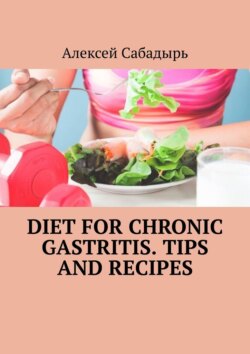Читать книгу Diet for chronic gastritis. Tips and recipes - Алексей Сабадырь - Страница 2
ОглавлениеChapter 1: Introduction to Chronic Gastritis: Main Causes and Symptoms
Chronic gastritis is one of the most common diseases of the gastrointestinal tract, which can lead to various unpleasant consequences if you do not pay attention to it. In this chapter, we will dive into the world of chronic gastritis, analyze the main causes of its occurrence and find out what symptoms may indicate its presence.
The causes of chronic gastritis can be varied. One of the main ones is the bacterium Helicobacter pylori, which can cause inflammation of the gastric mucosa and become the main cause of gastritis. In addition, poor diet, stress, alcohol abuse, smoking and certain medications can also contribute to the development of this disease.
Symptoms of chronic gastritis can manifest differently in different people, but most often include pain or discomfort in the upper abdomen, heartburn, belching, vomiting, appetite disturbances, a feeling of fullness after eating, lack of appetite and other gastrointestinal symptoms. manifestations.
Understanding the causes and awareness of the symptoms of chronic gastritis will help clarify your health status and provide timely assistance. In the following chapters, we will delve deeper into treatment methods and nutritional adjustments to combat this unpleasant disease.
Chapter 2: Basic principles of nutrition for chronic gastritis
Chronic gastritis is an inflammatory disease of the stomach lining that can lead to various symptoms such as pain, belching, heartburn, nausea and vomiting. Proper nutrition plays an important role in managing this condition, as certain foods and meals can worsen symptoms, while others can help reduce symptoms.
Basic principles of nutrition for chronic gastritis include the following recommendations:
Avoid spicy and fatty foods. Hot spices and fatty foods can irritate the stomach lining and increase inflammation. Therefore, it is important to avoid foods such as fried, fatty and smoked foods, as well as spicy seasonings.
Prefer small but frequent meals. It is recommended to eat food in small portions, but often – about 5—6 times a day. This will help reduce the load on the stomach and improve its digestive function.
Choose low-fat and easily digestible foods. Fermented milk products, lean meat, skinless poultry, fish, vegetables, fruits, cereals, boiled dishes and meat broths – all these products are recommended to be included in the diet, since they have a mild effect on the gastric mucosa and are well absorbed.
Avoid spicy, sour and hot foods. Spicy, sour and hot foods can irritate the stomach and increase discomfort. Therefore, it is worth limiting the consumption of foods such as lemons, oranges, spicy sauces, garlic, onions, peppers and other hot spices.
Avoid alcohol and strong coffee. Alcohol and coffee can irritate the stomach lining and cause an increase in the symptoms of chronic gastritis. Therefore, it is worth limiting the consumption of these drinks or completely eliminating them from the diet.
These basic principles of nutrition for chronic gastritis will help reduce symptoms and improve the quality of life of a person suffering from this condition. However, for each specific case, it is important to discuss nutrition with a doctor or nutritionist in order to develop an individual diet that takes into account the characteristics of the disease and the needs of the body.
Chapter 3: Prohibited foods for chronic gastritis: what should be excluded from the diet
Chronic gastritis is one of the most common diseases of the gastrointestinal tract, and its treatment requires serious attention to nutrition. One of the main tasks in the treatment of chronic gastritis is the elimination of certain foods from the diet that can aggravate symptoms and cause an exacerbation of the disease. In this chapter we will look at what foods should be excluded from the diet for chronic gastritis.
The first and perhaps most important food to avoid for chronic gastritis is spicy and fatty foods. Hot seasonings, spices, herbs, fried and fatty foods can irritate the gastric mucosa and cause pain and discomfort. Therefore, it is recommended to exclude foods such as chili, pepper, curry, fried foods, fatty meats and high-fat baked goods from the diet.
Foods that contain large amounts of acid should be avoided. Lemons, oranges, grapefruits, tomatoes and other acidic fruits and vegetables can worsen the condition of the stomach lining. In addition, acidic drinks such as carbonated drinks, juices, coffee and alcohol should also be excluded from the diet if you have chronic gastritis.
It is important to exclude from the diet foods that contain large amounts of preservatives, dyes, flavors and other chemical additives. These substances can negatively affect the functioning of the stomach, cause irritation of the mucous membrane and lead to exacerbation of gastritis. Therefore, it is recommended to monitor the composition of products, avoid food additives and give preference to natural products.
You should limit your consumption of foods that can cause allergic reactions. Milk, eggs, nuts, gluten and other potentially allergenic foods can aggravate inflammation of the stomach lining and lead to exacerbation of gastritis. Therefore, if you have intolerance to certain foods or allergies, it is recommended to avoid their consumption or consume them in small quantities.
In case of chronic gastritis, spicy and fatty foods, acidic foods, drinks containing acid, foods with chemical additives and potential allergens should be excluded from the diet. Proper nutrition is one of the main points in the treatment of chronic gastritis, and the exclusion of these foods will help improve the condition of the gastric mucosa and prevent exacerbations of the disease.
